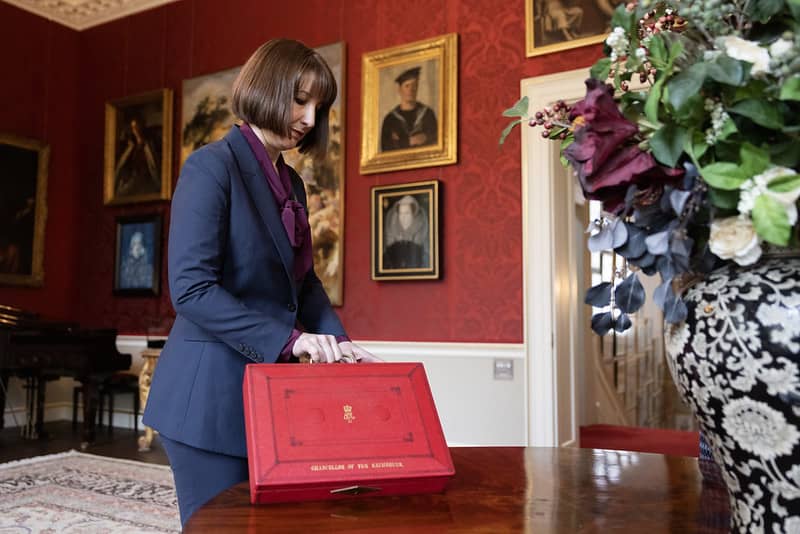Government Will Borrow £40BN More This Year
- Written by: Gary Howes

Chancellor of the Exchequer Rachel Reeves delivers the Autumn Budget 2024. Picture by Simon Dawson / No 10 Downing Street.
The UK government looks set to borrow an additional £40BN than previously planned from capital markets this year, having changed the goalposts used to determine its fiscal rules.
Borrowing will be much higher this year than previously forecast, coming in at £127BN in 2024/25, compared to £87.2BN previously expected.
Borrowing rises to £72BN vs. £39BN in 2028/29.
The government justified the increase in borrowing by changing the rules that govern debt sustainability,
It confirmed it would change the debt rule to now target Public Sector Net Financial Liabilities, whereas the previous target was based on Public Sector Net Debt, excluding the Bank of England.
This allows the government to differentiate more clearly between borrowing to fund day-to-day spending and borrowing to invest in capital projects.
The distinction is important as it allows financial markets to assess the sustainability of UK debt and seeks to avoid the kind of market meltdown that occurred when former Prime Minister Liz Truss tried to deliver her pro-growth budget.
"The Chancellor's fiscal framework is simple: going forward, borrowing will be reorganised to drive investment and put debt-to-GDP on a more sustainable footing. The focus now is on repairing public services and boosting investment with the aim of boosting growth. At its peak, the OBR expects announced policies to lift GDP by 0.6% in 2025/26," says Sanjay Raja, Chief UK Economist at Deutsche Bank.
The government also announced day-to-day spending would rise by 1.5% per annum in real terms from this year; this compares to the 1.0% that the previous government had planned. Capital Spending will grow by 1.7% annually in real terms.
To pay for this, the government announced an historic increase in taxation, with the Chancellor announcing £40bn in tax-raising measures.
However, the increase in day-to-day spending is still considered relatively austere, raising the prospect that further tax hikes would be required in the future.
"That it still very tight indeed," says Paul Johnson, Director at the Institute for Fiscal Studies of the 1.5% increase.
"We feel more is needed given the deterioration of public services after prolonged underinvestment," says Hailey Low, Associate Economist at the NIESR.
Deutsche Bank says that under the current budget rule (i.e., the stability rule) the Chancellor will have a mere GBP 10BN headroom.
Headroom refers to the sum by which the Chancellor has met her targets, i.e. it is the amount she could have left in contingency.
On the debt rule (i.e. investment rule), the Chancellor will have just under GBP 16BN in headroom, says Deutsche Bank's Raja.
"With public spending pressures only likely to increase from here, the Chancellor will be walking a tight rope between even more tax hikes and/or cuts to spending to ensure she does not fall foul of her newly designed fiscal charter," he explains.



